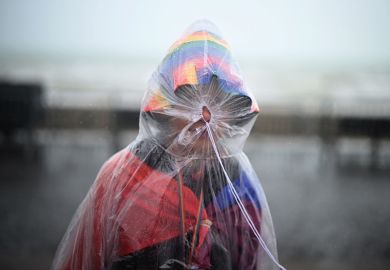It was Bonnie Tyler who posed one of the big questions of the 1980s: “Where have all the good men gone and where are all the gods?” In her hit Holding Out for a Hero, she told us what to look for: “He’s gotta be strong, and he’s gotta be fast, and he’s gotta be fresh from the fight.” But apparently she got it wrong. According to Stephanie Barczewski, we like our heroes dead, hopeless at following directions, and if they have a gammy eye or dodgy leg, even better.
It has long been the view that the British love a trier. They champion the underdog and adore the ridiculous outlier: think Captain Scott meets Eddie the Eagle meets Peter Andre. But Barczewski’s new twist is that the British have done this more than any other people on earth, and for longer, because of empire. She homes in on the classic staples of fallen heroes including John Franklin, David Livingstone and General Gordon, with a dash of the Light Brigade to illustrate our inner Kipling (not Mr but Rudyard); namely that triumph and disasters come and go, but it is character that matters more. In other words, “cometh the failure, cometh the man”.
Barczewski sees a growing emphasis across the 19th century on character over achievement and on failed heroes more than successful ones because “the British were not comfortable seeing themselves as conquerors”, and it was a device to maintain the pretence “that the British Empire was above things other than power, force and domination”. It was a strategy that only the most powerful could indulge in: the ultimate great-power trip.
This is a very readable book, and it’s always nice to see imperial figures winkled out of their post-colonial shell for a wider audience to pick over. It’s also a neat idea that speaks to the current preoccupation with the cultural presence of empire in the #RhodesMustFall campaign.
But is it convincing? Alas, not for me. It is not made clear, for example, who is directing this single top-down imperial project of cultural propaganda, using heroic failure to mask epic colonial disasters. It’s particularly hard to see that argument apply to Livingstone. He was not understood as a failure until Tim Jeal’s 1973 biographical demolition job of previous hagiographies. Until then, he was a brave explorer, a self-made man, a martyr to the noble cause of anti-slavery who gave his life so that Africans could become liberated, Christianised and interested in buying fish knives made in Sheffield. The churchgoing juvenile and adult public who had been exposed to his life via the inspirational biography genre certainly did not read him as a failure.
This is not to suggest that the impact of tragic deaths in harness were not profound. But responses were often personal and emotional. As one army man wrote, after the death of a fellow officer in the 1808-09 Peninsular War: “It will be the consolation of everyone who loved or respected his manly character…that…he has terminated a career of distinguished honour by a death that has given the enemy every reason to respect the name of a British Soldier.” It seems something very human, rather than a big con trick of empire enthusiasts, to turn death into a positive.
I think I’ll stick with Bonnie.
Joanna Lewis is assistant professor in the history of empires and Africa, London School of Economics. She is currently researching heroic masculinity and journalism in Africa.
Heroic Failure and the British
By Stephanie Barczewski
Yale University Press, 280pp, £20.00
ISBN 9780300180060
Published 18 February 2016
POSTSCRIPT:
Print headline: It’s what’s inside that counts
Register to continue
Why register?
- Registration is free and only takes a moment
- Once registered, you can read 3 articles a month
- Sign up for our newsletter
Subscribe
Or subscribe for unlimited access to:
- Unlimited access to news, views, insights & reviews
- Digital editions
- Digital access to THE’s university and college rankings analysis
Already registered or a current subscriber? Login




